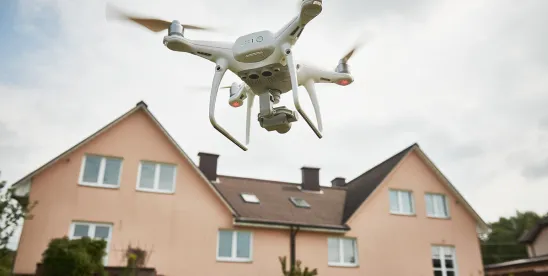In Long Lake Township v. Maxon, the Michigan Supreme Court had the opportunity to critically consider the extent to which property owners have an inherent right to prevent unwanted drone incursions into the airspace immediately above their land. It did not seize the opportunity, and instead used the U.S. Supreme Court’s jurisprudence on the exclusionary rule to avoid the thorny drone question altogether.
As we recently discussed, the Michigan Court had the opportunity to analyze questions of aerial trespass, drones, and privacy rights in one of the few chances for a court to begin our legal system’s resolution of those pressing issues. While there have been a few attempts at legislation regulating drone flights at the federal, state, and municipal levels, few courts have considered the impact of drones on property and privacy rights. In fact, the primary court case considering the rights of landowners to exclude intrusions into the airspace above their land is from the 1946 U.S. Supreme Court decision in United States v. Causby, which occurred when a North Carolina chicken farmer sued the United States government for flying military aircraft 63 feet above his barn, resulting in his chickens’ death.
In that case, the U.S. Supreme Court ruled that the ancient legal doctrine saying landowners own all airspace above their land (known by the Latin phrase “Cuius est solum, eius est usque ad coelum et ad inferos”) was not applicable in the modern age. Nonetheless, Mr. Causby won his case, as the Supreme Court ruled that a landowner owns at least as much of the space above the ground as he or she can use in connection with the land and has the power to prevent intrusions into the airspace above their property that would detract from their full enjoyment of the land.
The question is whether Causby’s rule applies in the age of drones. Privacy and property rights advocates have argued that landowners need to be able to exclude drones from some of the airspace immediately above their land. Others have argued that the Federal Aviation Administration must control all aircraft, whether it be passenger airliners, helicopters, or drones whatever the altitude of such aircraft. These advocates argue that air rights and privacy rights need to cede to developing technology and no landowner should control any airspace above the blades of grass. The Michigan Supreme Court recognizes this second outlook when it asserts in Maxon that “Drone technology is rapidly evolving, as are people’s expectations of privacy in the face of this technology.”
While the Michigan Supreme Court’s decision in Maxon was in line with established law on the exclusionary rule and an appropriate exercise of judicial restraint, the decision is also a frustrating dodge of these complicated and important legal issues. All of those questions need to be settled if drones are going to realize their full potential, so until either a state or local government crafts a new law that brings the issue to the fore, or a landowner decides to litigate privacy rights as against drone flights, the issues will remain unsettled.




 />i
/>i

